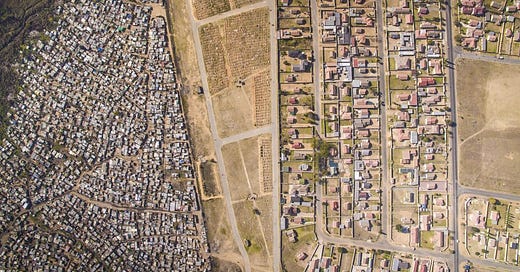
Did apartheid ever end in South Africa? Seems like a silly question but it’s not. Even among those astute observers who point to South Africa’s apartheid history to make sense of the current system in Israel-Palestine, there is hardly any discussion about the endurance of apartheid in democratic South Africa. This week I explore the issue by examining the ongoing battle over housing rights and land evictions in Cape Town.
Unlike Johannesburg and Durban, Cape Town has geographical barriers that create spaces of exclusion. The apartheid government used spatial urbanism to enforce separation. Evictions greased this system and they still do. After nearly three decades, Cape Town remains one of the world’s most divided cities. Wealthy (mostly white) residents live in the same exclusive neighborhoods that they did during apartheid, while townships continue to expand the Cape Flats, a windy expanse of land between Table Mountain and the start of the hilly Western Cape wine lands.
The myth of affordable housing
In a remarkable judgment this week, the Western Cape High Court informed the provincial government and the city of Cape Town that they must adhere to policies that specifically address apartheid urban legacies in central Cape Town by creating more affordable housing. The ruling hinged on the sale of a large building site in the wealthy suburb of Sea Point (pictured below) known as the Tafelberg site. The property was sold to a private day school for R135 million ($8 million) in March 2017 but activists pushed for the land to be repurposed for social housing.

Reclaim the City and Ndifuna Ukwazi, two housing activist groups, launched a court case to halt the sale of the property, arguing that the city failed to develop affordable or social housing in the city center for 25 years (city officials later admitted this). The judges found that the city hadn’t offered the land to the provincial housing department and had failed their constitutional mandate to provide access to affordable housing for people who qualify.
“The unlawful sale of the Tafelberg school site demonstrates this government’s resistance to social and spatial integration, and to using well-located public land to address the housing deficit,” Brett Herron, former Cape Town mayoral committee member for transport and urban development, told the Daily Maverick. “The fact that the Western Cape government persisted with the sale, despite all the evidence that the site was viable for affordable social housing – and despite the pleas of countless organizations and housing experts – was an act of arrogance and defiance.”
The right to have rights
Covering housing demolitions in Israel and Palestine was always particularly difficult. Watching a family lose its home and shelter felt like the most brutal form of oppression. At the time, I never thought similar events were taking place in post-apartheid South Africa. It seemed so contrary to the idea of democracy and accepted notions of dignity. I was wrong. The brutal force with which the city of Cape Town is carrying out land evictions is breathtaking.
The city owns a lot of land and has steadily ramped up its destruction of “illegal housing structures” in informal settlements. The growth in informal settlements is an discussion for another day but here are some background notes. Over the past years, there has been an uptick in clashes between poor residents and security forces but they don’t drum up much attention in the press.
That changed slightly during the Covid-19 lockdown when law enforcement officers ripped Bulelani Qolani from his home while he bathed and destroyed his shack in Khayelitsha, one of Cape Town’s largest townships in the Cape Flats. The naked man stood by as bulldozers ripped apart his home. It was a spectacular display of dehumanization, as writer William Shoki put it. The mayor of Cape Town went so far as to claim that Qolani’s nudity was planned to embarrass the city.
Last month, the Western Cape High Court ruled that the city cannot carry out housing evictions without a court permit while the country remains in a state of disaster. The case was brought following the Qolani incident but it won’t change much in the long term. Shoki reminds us that “the story of colonialism and apartheid is the story of the dispossession of black people from their land and eviction from their homes. It’s a story that’s remained unchanged in plot, shifting only its storytellers.”
Indeed, the story of apartheid in South Africa didn’t find an end in 1994. It changed complexion and received new leaders. For those who look to the anti-apartheid struggle as a blueprint for ending similar oppressions, they are doing themselves a disservice by ignoring the shapeshifting endurance of apartheid and its current economic manifestations.
There’s more to this story but I have already taken too much of your time. I’m putting the final touches on a piece about land evictions and apartheid’s endurance in South Africa for +972 Magazine (Can you believe it’s already a decade old! They have a membership campaign at the moment. Please consider joining). When that piece is published, I’ll have an excerpt here. Until next week.
Some things I read recently
How the UAE-Israel peace deal undermines political realism
Serious supply issues disrupt the book industry’s fall season
The end of enforced silence. Thoughtful piece on Palestinian joy
Melancholy of obsolete futures. Stimulating review of new books on Brutalism
Fact checking is the core of nonfiction writing. Why do so many publishers refuse to do it?
A final thought
“When history is written as it ought to be written, it is the moderation and long patience of the masses at which men will wonder, not their ferocity.” – CLR James, The Black Jacobins
If you like this piece, please hit the heart button below. It helps me reach more readers. Email me any thoughts and consider subscribing here.



